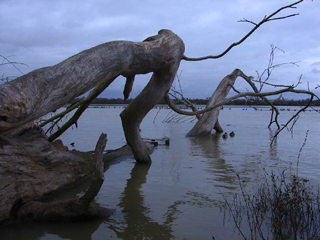
The first substantive chapter of my thesis is meant to be a review of the relevant literature. Actually, it would be more correct to say ‘relevant literatures’ since so many different ones touch upon the subject matter. While climate science, ecology, and biochemistry are all relevant to Kyoto and Stockholm, they are not directly relevant to the thesis. The point is to examine the roles played by expertise in policy formulation, not engage directly with the scientific issues at hand. As such, the primary sources of interest are not studies of global warming of POPs, in their own right, but the discussions that took place within the scientific and policy community about what is going on (to be analyzed in Chapter 3: Information and consensus issues) and then about what should be done about it ( Chapter 4: Normative and distributional issues).
Having a look at the conversations that took place within the scientific community about taking a political stake against nuclear testing might be one way of gaining insight into how scientists deliberate about political matters, and how the legitimate role of scientists and the scientific community is seen. Likewise, the whole debate that arose about Bjorn Lomborg’s controversial book. While the public perspective on these debates is largely outside the scope of the thesis, it might be worth touching upon the relationships between public, expert, and political opinion in the chapter on consensus and information issues.
The relevant secondary literatures are various. They obviously include political and international relations theory, especially as they concern questions about prudent decisionmaking, the welfare of future generations, and other normative concerns. (On the normative side, Henry Shue’s work is both highly topical and likely to be considered essential reading by his colleagues here). In general, I am a lot more interested in the core issues of political theory (legitimacy, justice, etc) than in those of international relations theory, though some discussion of the nature of cooperation between states and the formation of international regimes is required. To some extent, international law is relevant, insofar as it helps to define how science relates to the policy process and the practice of states. Elizabeth Fisher’s work on public administration has made me think that the Rationalist-Interventionist and Deliberative-Constitutive frameworks she describes can be applied to international environmental negotiations. It is also fairly clear that some understanding and discussion of the philosophy of science is necessary to prevent the thesis from being overly naive in that regard.
Histories and analyses of the meetings and agreements leading up to the Stockholm Convention and Kyoto Protocol are likewise important secondary sources. Rather than repeat lengthy summaries of what happened in the limited space that I have, I can further summarize it and refer the interested back to more comprehensive accounts. Similarly, other secondary discussions about the nature, causes, and implications of the two agreements should be mentioned.
The last section I mean to include in the literature review is a listing of recent theses, primarily at Oxford, that have addressed similar issues. While it is probably better to engage with more widely known scholars than debate the arguments of these theses directly, there will probably be a bit of the latter in the final version as well. In particular, it might be a good way of making reference to other potentially relevant case studies. Also, since these works have often led me to useful sources, it seems only courteous to give a nod to their authors. Also, they may appreciate knowing that at least one person has dug up the document they spent so much time and energy completing.
If people can think of any other literatures I need to address – or can think of any really stellar sources within the disciplines enumerated above – please leave a comment.




